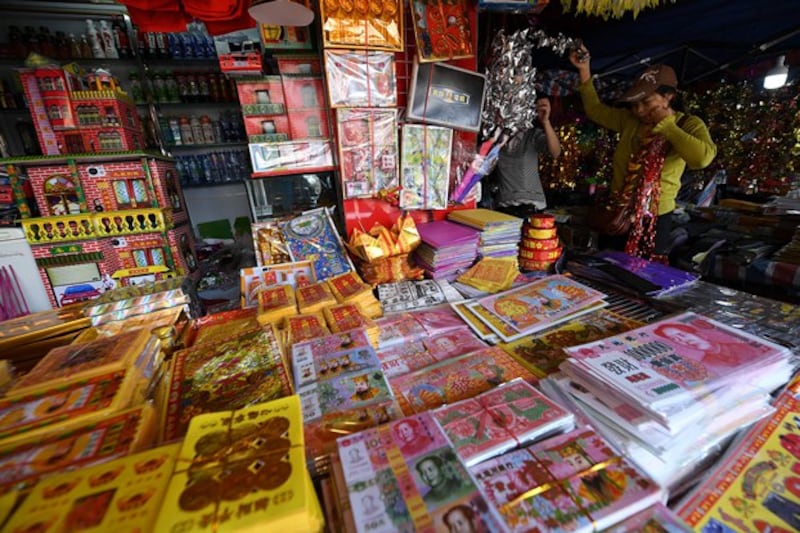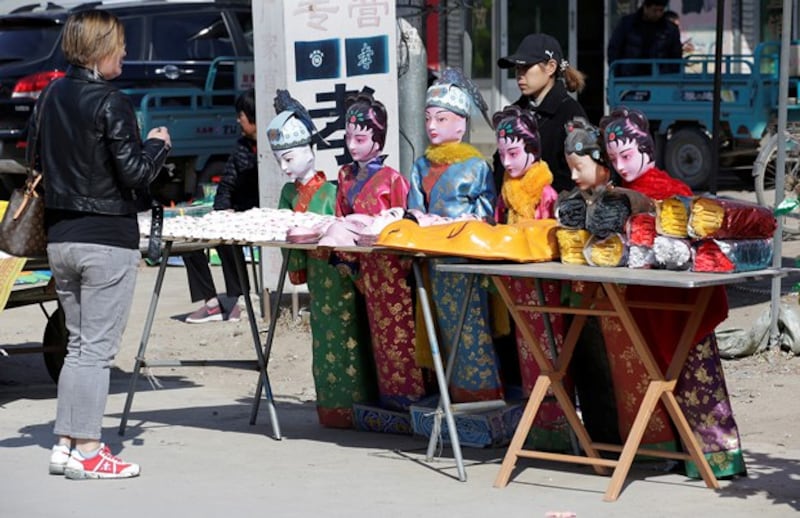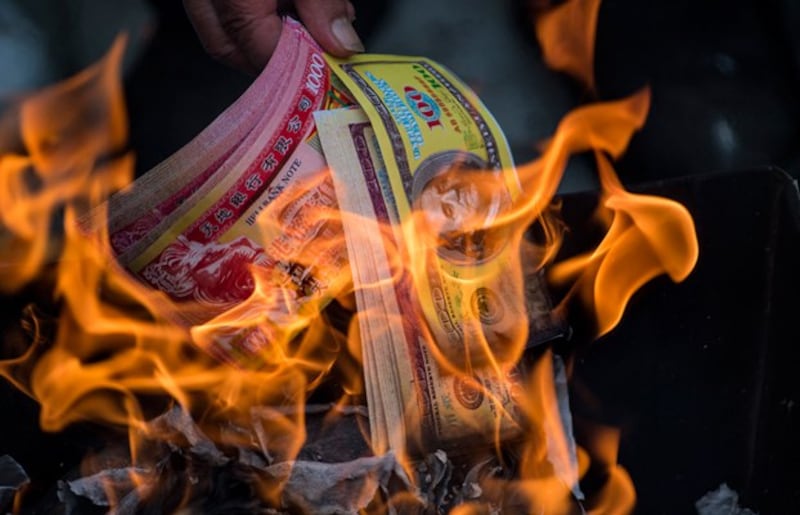Authorities in some parts of China have announced a ban on the burning of "ghost money" and other paper offerings for departed loved ones ahead of the annual grave-tending festival of Qingming next week, calling the practice "feudal superstition" and sparking an outcry on social media.
Bans on the burning of "ghost money" and on the sale of "superstitious feudal" goods have been issued by authorities in the northern city of Tianjin, in Nenjiang city in the northeastern province of Heilongjiang and in Nantong city in the eastern province of Jiangsu, among other locations, the party-backed Legal Daily newspaper reported on March 27.
Found in both Buddhist and Taoist traditions, the offerings involve burning "spirit money" that loved ones can use to have a decent afterlife, as well as paper effigies of desirable goods including cars, beasts of burden, designer clothing and consumer electronics.
Some funeral goods stores also offer bureaucratic paperwork to help the deceased navigate the complex bureaucracy of the underworld.

The bans come ahead of Qingming, during which the living make the trip to sweep and clean the graves of loved ones and leave offerings, sometimes eating a family meal at the graveside with portions for the departed.
The festival is also often a focal point for dissidents, who have been detained for visiting the graves of politically sensitive figures to pay their respects.
According to the Legal Daily, similar bans have also appeared in Beijing, Shanghai, Harbin, Qingdao, Henan, Chongqing and Lanzhou in recent years, in a bid to crack down on "feudal superstitions."
The Nantong ban warned of fines, administrative sentences and even criminal prosecutions for those found breaking the new rules.
Possible fears of public unrest
Beijing resident Guo Li said the authorities may fear public unrest at Qingming, as people had lost so many loved ones since the lifting of the three years of the zero-COVID policy in December 2022.
"There could be protests or petitions, so they are using these bans to stop people from pay their respects," Guo said. "The pandemic caused many deaths, and a lot of people in smaller cities are accustomed to honoring the dead with paper money."
The atheist ruling Chinese Communist Party has also warned media producers not to depict ghost stories and dramas based on magic, demons, and the Taoist underworld in recent years, despite a huge public appetite for such shows.
This year, there has been considerable pushback from social media, with many commentators complaining that the government is trying to control everything people do, even their expressions of mourning for loved ones.

Even the Legal Daily, the official newspaper of the Communist Party's Central Legal and Political Affairs Commission, drew the line at banning the honoring of ancestors by tending to their graves and burning offerings to help them in the afterlife.
"Burning paper money is a long-standing traditional custom that continues to this day," the paper said in an article on the bans. "On Tomb-Sweeping Day, the elderly and the young are brought to the graves of the ancestors, and wine, food, fruit, paper money, etc. are offered in front of the tomb to express longing for the ancestors."
"Chinese people are influenced by traditional cultural psychology and have a strong sense of family," the paper said. "Visiting the graves of ancestors is their special way of remembering their ancestors."
It noted concerns over hill fires and air pollution caused by the mass burning of offerings, but said there was no "one size fits all" solution to the problem.
"This is too mechanical and needs to be carefully considered," the article concluded.
It's all about control
Social media comments appeared mostly to agree.
"They want to control everything yet they can't manage anything well," grumbled @Home_is_a_Ming_Dynasty_horse-racing_farm from Jiangsu province.
"Are you going to destroy the Four Olds all over again?" @User_7839112400 from Guangdong asked, in a reference to the destruction of objects and practices from traditional Chinese culture during the 1966-1976 Cultural Revolution.
"So they want to control that too," commented @User_7430652639 from Shandong province, although @User_6278186707 called for the practice to be "banned nationwide."
Jiangsu-based current affairs commentator Zhang Jianping said the bans were an expression of "unchecked power."

"This custom has existed for hundreds or thousands of years," Zhang said. "It's very random for them to intervene in that using administrative measures."
"It's similar to the way the authorities bulldozed the graves of our ancestors [ostensibly] to grow more food when I was a kid, yet people still died of starvation," he said in an apparent reference to the Great Famine of 1959-1961. "These acts of unchecked power are still happening."
A resident of Shanghai who gave only the surname Chen for fear of reprisals said he remembers when burning paper offerings was classed as "feudal superstition" during the Cultural Revolution.
"This is a Chinese cultural tradition they are messing with now, with the legacy left by our ancestors," Chen said. "This is our way of paying tribute to 5,000 years of Chinese culture."
Translated by Luisetta Mudie. Edited by Roseanne Gerin.
